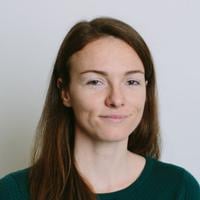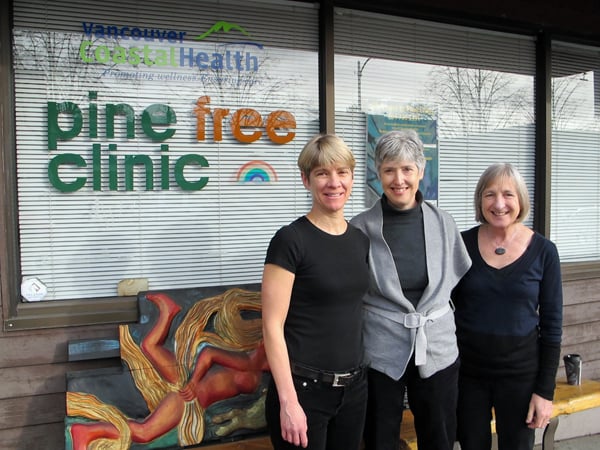Art Hister says he's never enjoyed practicing medicine more than when he worked out of the small office of a 10-by-20 foot trailer at the corner of Pine and 7th Streets in Vancouver.
It was the early 1970s, and the 20-something MD had just arrived on the West Coast. Looking for a gig, he wound up the first physician (or second, it's hard to recall much from those days) in the new, experimental Pine St. clinic.
Back then the clinic's aim was to treat transient and troubled youth. Hister found himself handling the "newish kinds of problems" they faced, issues that weren't served very well by the regular medical system. His patients needed birth control, or to get an infection checked out. Gonorrhea, he remembers, was the "bread and butter" of the clinic in those days.
The patients came in droves, and not just from local homes. Vancouver was a cultural magnet for youth at the time. When the clinic's diminutive waiting room in the centre of the trailer overflowed, they lined up outside. Mostly teenagers in need of care, they didn't seem to mind.
Hister is today a locally-known "media doctor" who appears on Global TV and radio shows as a health analyst. Some of the people who joined him in keeping the Pine Free Clinic going became chief city doctors and advocates who would shape local health policy at the highest levels, including British Columbia's top public health officer.
Four decades ago, the clinic "was, needless to say, a revelation and an eye opener, and it was probably the best thing that ever happened to me in my working life," Hister says.
The Pine Free Clinic pioneered providing confidential care for young people's sexual, physical and mental health. What seemed new at the time has become the standard now.
Today, the clinic celebrates that legacy. Long grown out of the trailer, staff present and past will gather in the current location, a nearby office on West 4th St., to toast 40 years (42, if you count the experimental start-up years) of providing care to the city's neediest.
Parents and privacy
The waiting room of the Pine Free Clinic nowadays doesn't exactly betray its radical roots. The posters on the walls encourage positive body image and safe sex, and feature '90s era, vaguely Degrassi-like kids. Other than the bowls of colourful condoms sitting at reception, in the offices and on every side table, it's a fairly standard-looking clinic.
But it wasn't so long ago that a clinic designated for needy or neglected youth was difficult to conceive of, says Dr. John Blatherwick, who was Vancouver's chief medical health officer for years until retiring in 2007.
Blatherwick was a resident at Vancouver General Hospital -- what he then called the "Jericho Hilton" -- in the early '70s when he began to notice a number of uninsured people, especially youth, coming to the hospital for treatment. He decided to ask Gerry Bonham, the city's health officer at the time, about starting a youth-only clinic. As it turned out Bonham was already pondering the idea, and hired Blatherwick on the spot. Hister soon joined the team.
When it started out, the clinic got its share of flak. Specializing in teenage sexual health meant providing birth control, for example, and the staff worked hard to respect its patients' privacy. Still, parents complained.
"It was health care that was needed, but some people certainly seemed to think we were radical. We found it very disconcerting," Blatherwick says.
"We were constantly under pressure about what age [we would] give out birth control. It's funny to think about it, because both Art and I are really relatively conservative people, but we both knew there wasn't an age that was right. The thing that was right was that if you're having sex, then you needed to have birth control. That was the criteria that we were using."
Hippies, drugs and attitudes
Blatherwick also treated youth who used drugs at the clinic. Coming from a military background, that experienced changed his entire worldview, he says.
"I started to find out that drug addicts cared about their health; they just couldn't do anything about their addictions. It changed my whole perspective, that these were people too... it helped shape my public health career. Because I knew the attitudes I had at that time going into the Pine St. clinic were the kind of attitudes that most people in medicine had."
In those early days the medical rights of young people, especially those who experimented, weren't well-established, Hister says.
"You can imagine the hippies in the late '60s or early '70s having to go to Vancouver General Hospital and tell them about the drugs they were using, or the sexual forms that relationships were taking back then. This was not a comfortable era. Back then there was nowhere to go."
The clinic helped fill a gap in care for their sexual health, he says.
"We made up the rules as we went along. Nobody told us what to do," he explains. "Now it's all standard. Kids get the care that they need, and thank god for that."
Dr. Liz Whynot, a former president of BC Women's Hospital and Health Centre, joined the clinic in 1973, she recalls.
"We evolved pretty quickly a sense that we were there for the patients, to help make them safe. The issue always was, should parents control their kids health? Or should the kids make their own decisions?" she says.
Soon after Whynot started, Dr. Perry Kendall -- B.C.'s current provincial health officer -- joined the clinic's team. "He looked like Mick Jagger in those days," Whynot remembers. (Kendall was not available for comment on this story.)
Whynot also fondly recalls the "collective" of people who helped the fledgling clinic grow, including the support of non-medical staff like Judy Graves, Vancouver's soon-to-retire homeless advocate.
"Judy was very warm and wonderful as you can imagine, and was a champion of breastfeeding. I think we all left a cafe once in protest because the owner didn't want Judy breastfeeding her daughter there," Whynot says.
The clinic was constantly pushing boundaries.
'Non-judgmental, confidential care'
While attitudes towards sexual health may have evolved a little, the clinic's young clientele hasn't changed much over the years, says nurse practitioner Katherine Mooney.
The number of patients has grown from about 200 a week in those early years, to about 500 a week today. The clinic now primarily serves youth 24 and under, but makes exceptions for older patients if they're uninsured. And it's open five and a half days each week, with some extended hours -- a rarity for youth clinics in the city, Mooney says.
With the clinic since 1981, Mooney sees the combination of care available to patients as one of its strengths today. Counsellors, nurses and doctors work together as a team (though there is no longer a nutritionist on staff).
"I don't want to make it seem like youth can't get good care from their family docs, but I think to have that focus really benefits youth," she says. "I think why youth see it as unique is it's non-judgmental, confidential care. Privacy is respected."
"It fills a gap," says Dr. Susan Comay, who joined the clinic as a physician in the mid-'80s. "If it wasn't here, I think there'd be a few generations of young people who didn't get their needs met, whether it's physical, mental, reproductive health."
Some issues at the clinic are timeless. Whether it's "Oh, I didn't want to ask him to use a condom," or "I didn't want to use a condom because she might think I've got something," Mooney hears the same refrains year after year. There are still stigmas to overcome, she says.
Comay says she looks forward to how the clinic will evolve, and what role it will play in the future of health care for youth and marginalized adults.
But for the moment, on its anniversary, the Pine Free Clinic will celebrate years of steadfast care.
"I'm really happy to know that it hasn't changed. In that respect, it's still there for kids, and they're able to provide a really excellent and enlightened service," says Whynot.
"We will always have a need to respond to people who are on the margins, kids or adults. Safe health care, or a place where you feel safe to talk about yourself, it's a key, key part of people taking control of their lives, and being able ultimately to make themselves safe and be able to live." ![]()
Read more: Health, Gender + Sexuality
















Tyee Commenting Guidelines
Comments that violate guidelines risk being deleted, and violations may result in a temporary or permanent user ban. Maintain the spirit of good conversation to stay in the discussion.
*Please note The Tyee is not a forum for spreading misinformation about COVID-19, denying its existence or minimizing its risk to public health.
Do:
Do not: